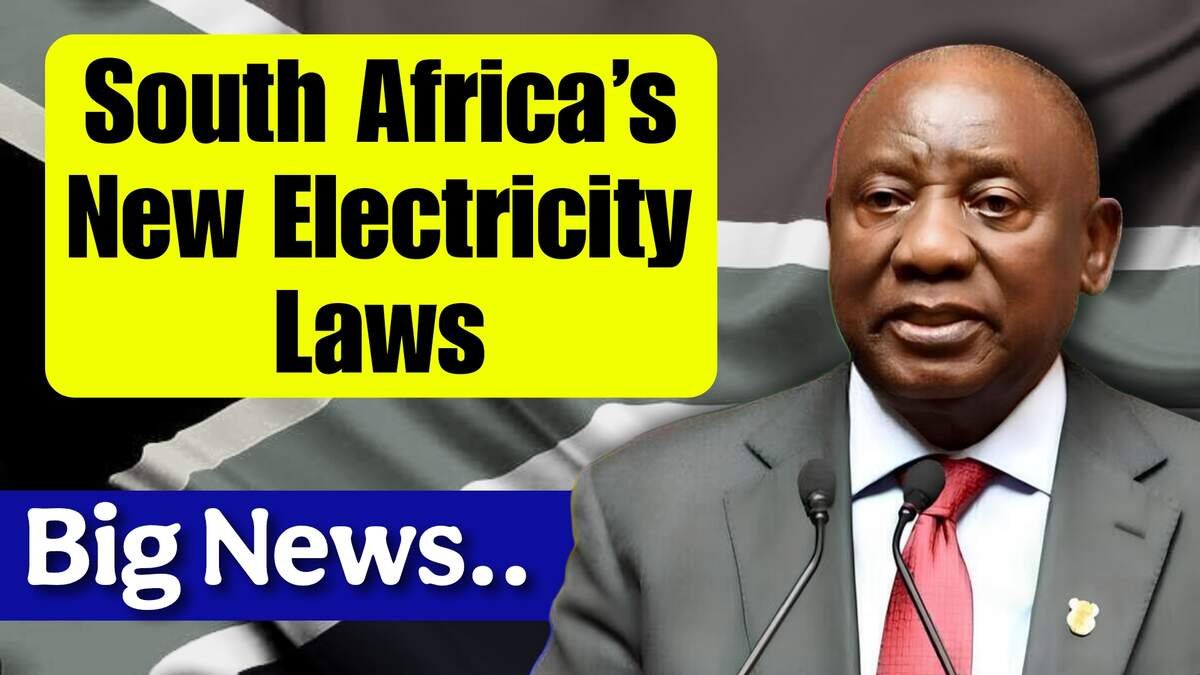South Africa’s New Electricity Laws : Here to deal with the electricity crisis in South Africa, the government has given us a new electricity Act, to be enacted by 2025. Intended for energy reform and modernization in the country, energy will push toward renewable energies. It is meant to deliver stable and reliable electrical supplies to every citizen. It is expected that the new laws will work in favor of households, businesses, and the economy. The new laws that explain everything, therefore, will be dwelt upon below.
Why The New Electricity Laws Were Essential!
The energy sector of South Africa faced several challenges over the past few years, with frequent load shedding, old infrastructure, and coal dependency being the most rampant among a cluster of issues. Consequently, economic growth has suffered and daily life of millions of South Africans has been disturbed.
The government has introduced these laws to run in the broad strategy to reform the energy sector:
- Decrease dependency on coal and promote cleaner forms of energy.
- Promote private sector participation to increase generation capacities.
- Streamlining rules to attract investment into renewable energy projects.
- Ensure fair and transparent electricity pricing for consumers.
Some Of The Pillars Of The 2025 Electricity Laws Are
- Increase Of Renewable Energy Projects: The new acts, particularly the Roadmap, are soul searching acts meant to burgeon the adoption of diverse renewable energy resources, including solar, wind, and hydroenergy. The government has set the target of 50% renewable energy contribution to the generation of electricity by 2030.
- Private Sector Involvement: The distribution sector will be opened to IPP contributions to the national grid, creating an atmosphere for mainstream IPP players to come in and supplement the dwindling reserves of the 41,000MW of coal-based power generation assets committed to the grid by Eskom.
- Energy Storage Solutions: Large-scale battery storage systems will be developed along with the intermittent nature of renewable energy into these new laws. These machineries would potentially accumulate extra electricity generated in peak production points to use in periods of high demand.
- Smart Grid Technology: The laws have provisions that will see the integration of smart technology across the national grid for the purposes of monitoring and optimizing energy distribution. This will be used to diminish power losses and enhance load management.
- Consumer Protections: The new package procures just and transparent conditions of service in view of electricity tariffs. Limited subsidies could further be provided for low-income households to make electrical energy affordable.
- Decentralized Energy Systems: Governmental policies have been working towards facilitating the creation of community-based energy projects such as solar cooperatives to empower local communities and decrease their dependency on the national grid.
What This Means For South Africans
The new electricity laws aim to bring significant benefits for the citizens and the industries:
- Reliable Supply of Power: Reduced load-shedding and improved grid management will ensure fewer power disturbances.
- Decreases Energy Costs: Diversity in the energy market through heightened competition will bring the cost of power down over time.
- Job Creation: Shifting focus to renewable energy and upgrading of the sector will give thousands of jobs to the people themselves.
- Environmental Benefits: As a renewable project, there is hope that cleaner energy sources will reduce pollution emissions in South Africa, and help combat climate change.
Challenges And Implementation
The reforms are indeed promising;, however, it might take some time to go through the implementations due to constraints such as immense amount of money for electricity manufacturing, getting the public to cooperate with them, and removing delays as a result of bureaucratic checkmate. However, the government contends that several operative plans to run activities with complete schedules and benchmarks have already been established for implementation.
Also Read: SASSA Postbank Black Card Replacement Guide 2025
